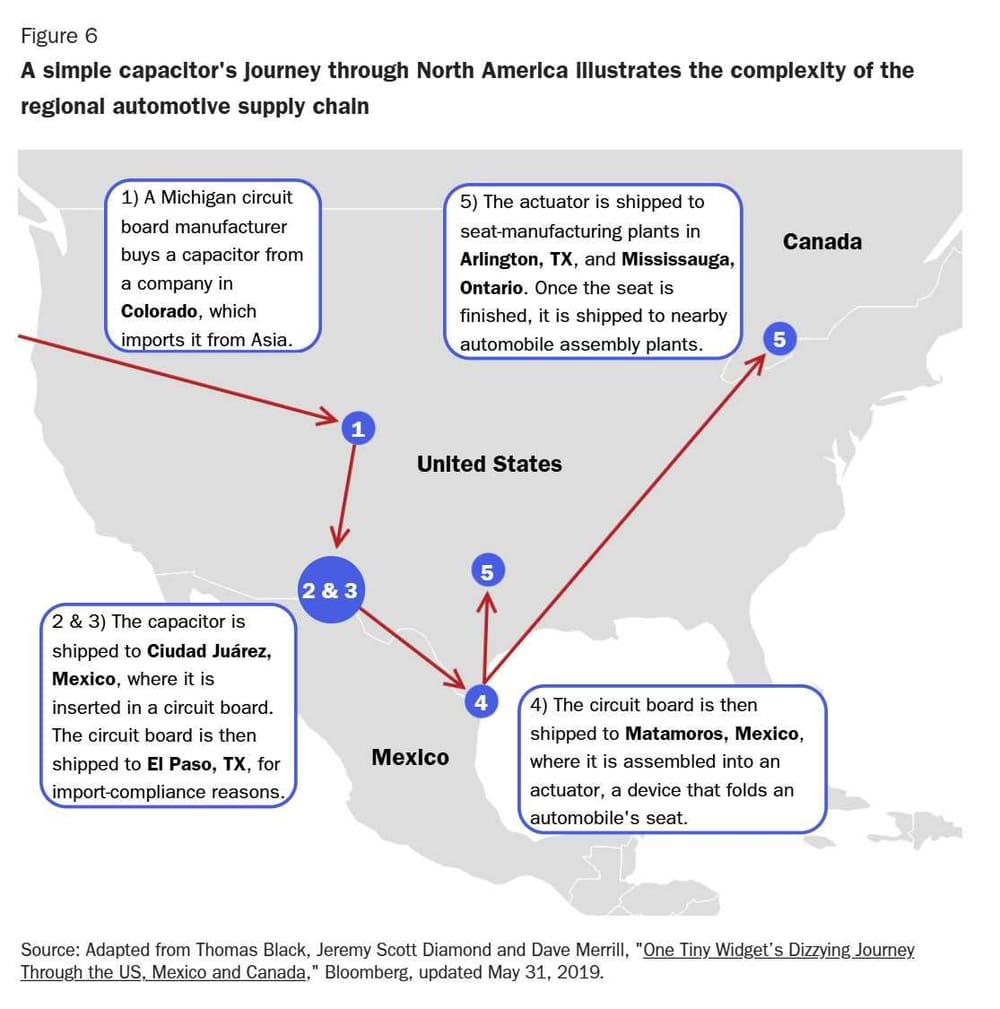The dumbest trade war in history
Well, it happened. Earlier today, US President Trump followed through on his threat to whack Canada and Mexico with 25% tariffs on all goods, with an additional 10% tariff on China for good measure (China already has a 25% tariff on many of its goods left over from Trump 1.0).
I shamelessly stole the title of this post from the WSJ, which had this to say:
“This reminds us of the old Bernard Lewis joke that it’s risky to be America’s enemy but it can be fatal to be its friend.”
It’s worth noting that despite Trump having threatened this move for several weeks, markets only started to price it in over the weekend. As recently as Thursday, the odds of this taking place before March were below 30%:
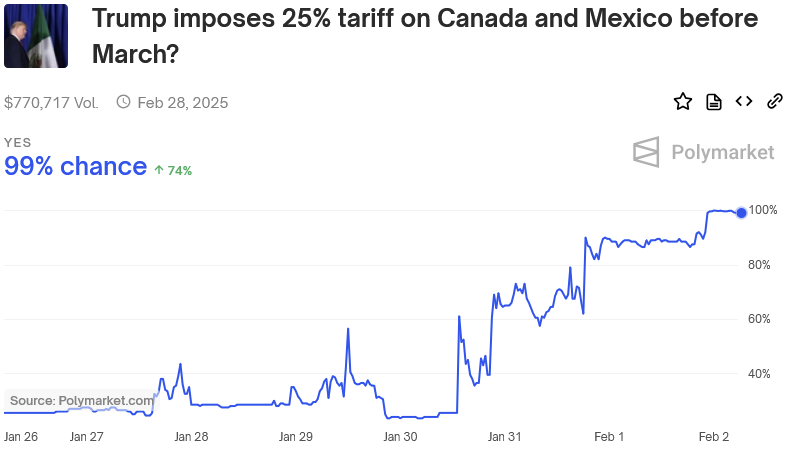
Wall Street was just as surprised, with S&P500 futures dropping more than 1%:
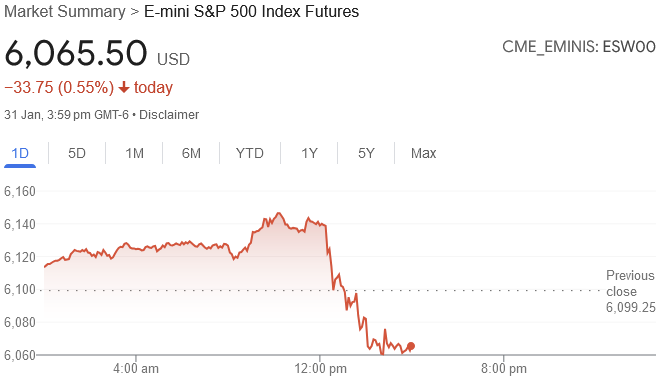
Basically, people thought Trump was bluffing to win the election. Surely, surely, he wouldn’t be stupid enough to follow through with his threats and actually whack substantial tariffs on his country’s two largest trading partners, which also happen to be close allies.
But it turns out that yes, he is in fact stupid enough.
Make it make sense
Henry George once wrote:
“What protection teaches us, is to do to ourselves in time of peace what enemies seek to do to us in time of war.”
Make no mistake about it: these tariffs will hurt the US economy. They’re big – equivalent to an 11% across-the-board tariff, up from the current 3% – and will result in:
- consumers in all countries paying higher prices for goods;
- exporters suffering from exchange rate appreciation, the inevitable retaliation from politicians in Canada and Mexico, along with higher input prices; and
- importers losing because foreign goods are now more costly to acquire.
This is all basic economics, a class Trump must have slept through during his time at the University of Pennsylvania’s Wharton School:
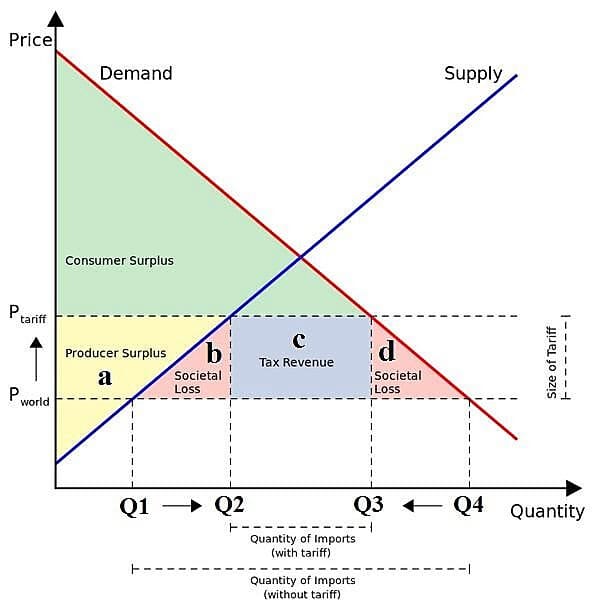
These tariffs will also do nothing to achieve their stated aim, which according to Trump is to stop “illegal aliens and drugs” coming into the US (likely a thinly veiled guise for his real goals, as a US President cannot implement tariffs without a “national security” reason).
But even if Trump’s endgame is to balance trade with these countries (for whatever reason), tariffs don’t do that: both imports and exports will contract due to the tariffs themselves (imports) and exchange rate appreciation or retaliation (exports).
If Trump actually wanted to shrink the US trade deficit, he would first need to cut the large and growing budget deficit, which encourages foreign capital inflows and a strong US dollar that are offset by a trade deficit (the balance of payments must balance!).
But perhaps Trump’s true intention is to bring manufacturing back to America. Unfortunately for him, they won’t do that either because tariffs “act more like a tax on domestic manufacturers who use these [tariffed] imports, raising their costs instead of protecting them from foreign competition”.
The fact is that around half of US trade is for inputs used to produce final goods, and many of those inputs cross the Canadian and Mexican borders multiple times before final assembly:
Trump, in all his wisdom, also removed the de minimis exemption for small packages – everything will be covered, even “a birthday gift from Windsor to Detroit”.
The administrative costs of enforcing these tariffs will therefore be significant, but the real damage will be to American business and households, the latter of which will now see their tax burden increase by more than $US670 this year alone.
The biggest losers
But for all the harms these tariffs will cause the US economy, the outcome is gloomier for Canada and Mexico. Both of those countries are linked to the US much more than the US is linked to them. For example, one in six Canadian jobs can be traced to exports, 77% of which go to the US.
Exporters can of course divert to other markets, and over time supply chains will shift, but there’s no denying that the cost to their economies will be greater than to the US:
“Exports to America are worth roughly 20% of Canadian GDP and 30% of Mexican GDP. By contrast, American exports to Canada and Mexico combined are worth just 3% or so of American GDP… tariffs of 25% could shrink the Mexican and Canadian economies by 1-2% over the next few years. With just the current measures, the growth drag in America will be closer to 0.2%.”
Here’s a chart of the estimated damages from the PIIE:
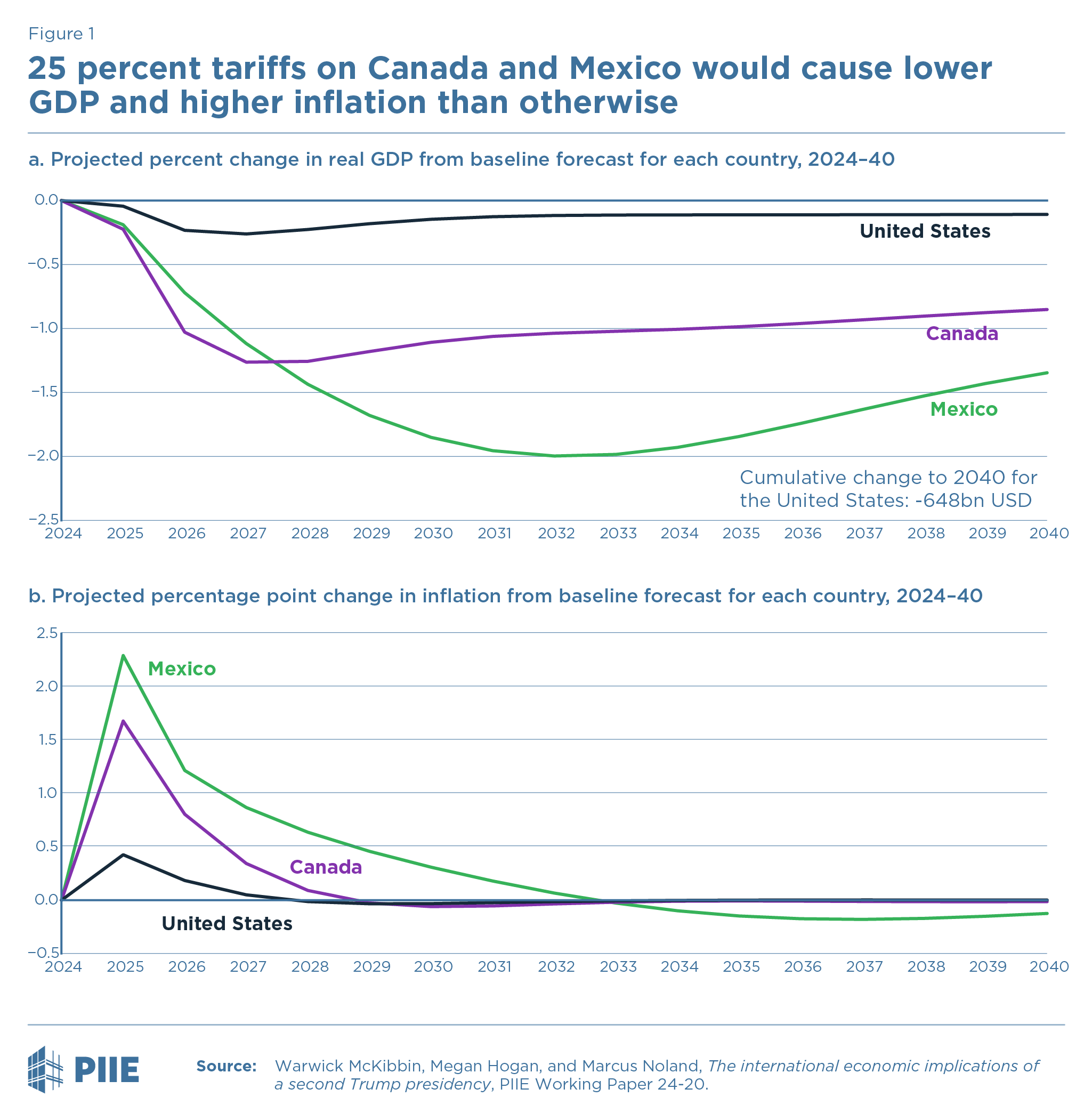
Any tariff response from Canada, Mexico, or China will worsen the damage to their own economies. But their people will inevitably be calling for something to be done, and the optimal political response – Canada has an election this year – may well be to dig the hole even deeper by retaliating (hopefully in a highly targeted way), even if it will make their citizens worse off.
There’s no art to this deal
Trump has now shown that he holds deep convictions about tariffs well beyond using them as a “negotiating tool”:
“It’s not a negotiating tool. It’s pure economic. We have big deficits with, as you know, with all three of them.”
On top of today’s tariffs Trump has even threatened Taiwan’s semiconductor industry, and US allies in Europe will inevitably be next on his list.
While many initially thought that tariffs were simply a means to an end – a method for Trump to achieve his non-economic policy goals – it’s now clear that for Trump, tariffs are an end unto themselves; a way “to enrich our citizens”, as he erroneously declared in his inauguration speech.
Yes, Trump may yet back down if he gets some kind of “concession”, or the inevitable market turmoil turns out to be too intense even for him. But that doesn’t mean there won’t be permanent damage caused by this rash decision. The US under Trump cannot be trusted, and governments and businesses in other countries will increasingly look internally or towards the likes of China, even if it hasn’t always been able to separate politics from trade, either.
As for Australia, the best strategy from here is to not get involved. We have a moderate (~$31.5 billion in 2023) bilateral goods and services trade deficit with the US, which while economically irrelevant, is a significant advantage when you have a madman at the helm of the world’s most powerful country.
Perhaps it’s also good news that the first AUKUS submarine isn’t due to be delivered until “the early 2030s”, i.e. after Trump’s second term has come to an end. But there’s still a decent chance he nixes it before then, so our next Defence Minister might want to think about devising a backup plan.
Anyway, that wraps up what was a crazy day.
Comments
Comments have been disabled and we're not sure if we'll ever turn them back on. If you have something you would like to contribute, please send Justin an email or hit up social media!

